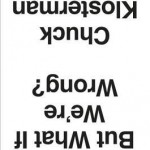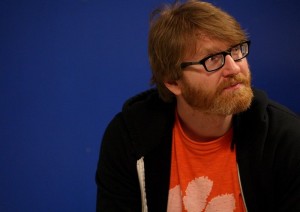[3-minute read]
If you’ve read one of these things before, you know my schtick. (It’s not so artificial, though, not really.) I’m a confirmed Accidentalist as a reader, about the farthest imaginable distance that a member of the homo sapiens tribe can be from A) a trend-watcher, eyes peeled for the New and the Hot and the Must-Read¹ or B) somebody with a plan. Usually, that means that when I get around to reading something I wish I’d read it long before. So.
¹ Cases in point: I’m still smart-phone free. I drive standard. I play vinyl records and CDs.
I’ve made no sudden conversion to Column A or Column B, but am still prone to literary accidents, which is how I ran into Chuck. Klosterman’s 2016 – wait, isn’t that THIS YEAR? – book-length thought experiment But What If We’re Wrong? Thinking About the Present As If It Were the Past. It’s my first book-length CK, though I used to read him often on the Grantland sports ‘n ‘popcult website (ah, Grantland, we hardly knew ye). The moral: it pays, in intellectual and vaguely spiritual terms, anyway, to go to the library. [That hyperlink right there was to a Neil Gaiman essay. You should go to it. And to the library.] BWIWW?, with its black text on white, upside-down cover, leaped into my sweaty palms from my local branch’s “Express Reads” shelf. Get it now, it’s hot, but you have only 7 days before library muscle is pounding on your door…²
² I should have bought it. Ended up costing me a $10 library fine.
It’s a smart and entertaining book, which concerns itself with “Big Potato” questions that cluster around the title query: how can we be so sure about nearly anything, when time so often (and often so quickly!) proves us to be out to lunch without a paddle? what can we safely predict about our futures? do we have even half-decent tools for justifying what we think we know for certain? Klosterman is stylish, contrarian and witty on such starchy questions as these³, there are any number of quote-worthy morsels, but I liked the one below. Sportsy readers don’t get nearly enough Cool Quotation time, so this one’s for them. And for you.
³ No small potatoes. Only big ones are his prey. “Starchy” questions. Get it, didja get it?

The front cover. The subtitle is on the back, right-side up, which forced me to regularly open the book from the back.
As he concludes the book, Klosterman turns his attention to sabermetrics, the growing movement to quantify and generally science-up the approach to appreciating and understanding sports, the teams and the athletes. Why care? you ask. I answer, Because there’s more to sports than just sweat and dunks, grunts and numbers, for one thing, but also because Klosterman makes reading about sports feel fresh and [gulp!] enlightening. He makes sport feel like a genuinely useful lens to understand human beings and their cultures. Bam. Tell the truth: you have to finish this piece now, right? And the quote is just around the bend.
On a day when I’m frisking about on my computer and getting lots of fine things done — none of which include me actually writing anything beyond overdue emails, which are not evil in and of themselves but do help me forget the Writing Plan (such as it was) for the day — I like to recall Professor King’s encouragement. This comes from his excellent book-length essay on the creative life, On Writing.
My series Better Read Than Never – okay, technically, it is now a series because there are two of ’em – has been stalled because I’m too anxious to do too good a job for the too few of you out there in Electronville who, come to think of it, are often too busy to read The Howden anyway. My library copy of The Iron Cage: The Story of the Palestinian Struggle for Statehood has been renewed three times and I’ve nearly paid for it in fines; mind you, I’ve never begrudged library penalties, which are merely an unreceipted form of useful charity. The review is going to be long unless I terminate it thuddingly. But it’ll come soon-ish. (I think.) (Prologue ends.)
In the meantime, though, I’ve read a couple of other fine things, one of which is recent enough that it doesn’t quite fit the series rubric, but makes me eager to read two writers that I’ve mainly missed so far. It’s an odd little book, one I found occasionally flat yet generally compelling, called What I Talk About When I Talk About Running. It’s by a Japanese novelist and translator named Haruki Murakami, and it’s a curious kind of memoir. It mainly tracks his twenty-five year career as a recreational long-distance runner (and sometime triathlete), which roughly parallels and, he maintains, both informs and essentially supports his work as a writer.
Murakami is a diffident confidante, an unfamiliar voice that obscures as much as it reveals about the author. On more than one occasion, he notes that readers “probably wouldn’t like” him, and he is sometimes distant and bland in his summaries of the meaning of this observation or that running result. That’s just how I am. That’s life. This is how it goes. At first, I found these simple blurts disappointing, a signal that this book was something of a rush-job, but I came to see them as an accurate (and, finally, interesting) portrait of a man in search of some limited and non-ecstatic conclusions about his life and its meaning.
In fact, by the end I regarded his tone as a subtle rebuke to the my life is singular and rich and here’s how ALL could benefit from fingering its silken edges ambience of some (western) celebrity bios. For only one small example, an early casual mention of having been married at 22 seemed to me a clear signal that marriage was far in his rear-view window. In fact, his wife later makes brief and almost accidental appearances in this memoir of monkish discipline; she is never named or described, a level of biographical focus (and adherence to privacy, I suppose) that is startling. The Western attachment to personality, fame and disclosure seems exhibitionist by comparison.
He likes to be alone, and he’s with the Buddha: Life is suffering. This narrow gateway to understanding informs his thought about running and life: “[t]hey might not amount to much, but they are personal lessons I’ve learned through actually putting my body in motion….They may not be lessons you can generalize, but that’s because what’s presented here is me, the kind of person I am.” I’m a worn-out ex-jock who still tries to run, though the distances have never been what Murakami routinely pulls off. (The jerk.) I’m also a writer, and the confluence of these two themes – rigorously and sacrificially adhered to by this paragon of focus and discipline – really took me in. If you have either of these two interests, or both, you may be, too.
And the title? Its oddly rambling nature fits perfectly, but it wasn’t until Murakami’s after-word that I realized it was a homage to one of his favourite writers to read and translate into Japanese, the American minimalist Raymond Carver. (I know Carver only by reputation – writers often refer to him – and he keeps popping up for me. Another one for the Better Read Than Never list.) One of Carver’s best-known tales is the title story of a notable collection: What We Talk About When We Talk About Love. Ah. I think I understand. Hiraku Murakami loves running. He loves writing. He loves simplicity in both. That’s how things work for him.
After hearing Sheldon Kennedy interviewed by Jim Rome a couple of weeks ago, I wanted to read his book, the finally I’m ready to tell about all this stuff publication of his memoir of his hockey career but especially of the years-long sexual abuse he endured from a trusted coach. One of the bitter ironies of Kennedy’s life is that only now, after a very successful junior career and a journeyman’s eight years in and around the NHL, is he rediscovering the love and joy in the game that he had known as a child.
Why I Didn’t Say Anything: The Sheldon Kennedy Story is very affecting reading, and answers most of the quiet wonderings I’d had about this episode, a tale which I mainly knew from sensational headlines and brief interviews. His voice comes through strongly but reasonably and without bitterness, though his co-writer and editors have allowed many grammar errors and typos to remain. (Kennedy tells of a healing encounter with residents of the Morley Reserve during his cross-Canada skate to heighten awareness of sexual abuse. The meeting was so emotional, he reports, that “everybody was balling” after it. What, a 3 on 3 hoops tourney broke out?) This is certainly not high literature, but the raw sincerity of Kennedy’s prose is a revelation and a challenge to anyone who cares about sport, about children, or about the personal and societal damage caused by sexual abuse. It’s a quick read and a useful one.


